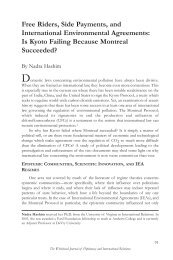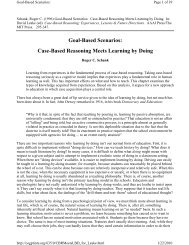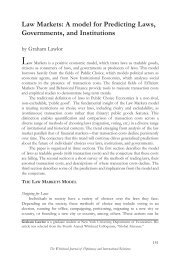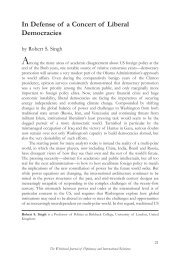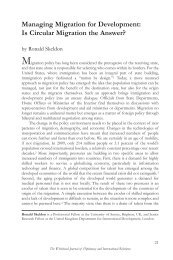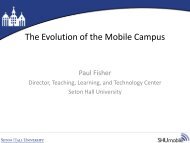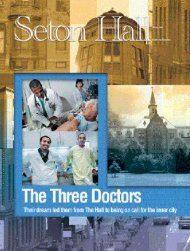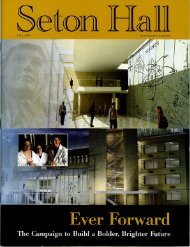Rethinking the Cuban Regime: Implications for Transition Paths and ...
Rethinking the Cuban Regime: Implications for Transition Paths and ...
Rethinking the Cuban Regime: Implications for Transition Paths and ...
Create successful ePaper yourself
Turn your PDF publications into a flip-book with our unique Google optimized e-Paper software.
REThInkIng ThE CUbAn REgIME<br />
members currently hold four of <strong>the</strong> ten vice-presidencies of <strong>the</strong> Council of State<br />
<strong>and</strong> Ministers, <strong>and</strong> nine of <strong>the</strong> twenty-three Politburo seats. 44<br />
Military control of <strong>the</strong> repressive <strong>and</strong> intelligence apparatus, <strong>the</strong> economy, <strong>and</strong><br />
<strong>the</strong> government leaves <strong>the</strong> PCC as “<strong>the</strong> weakest link” of <strong>the</strong> two relevant actors<br />
within <strong>the</strong> regime. Unlike <strong>the</strong> FAR, <strong>the</strong> PCC did not make <strong>the</strong> Revolution. The PCC<br />
did not emerge as a united institution until 1965, <strong>and</strong> it never institutionalized <strong>and</strong><br />
gained administrative <strong>and</strong> managerial expertise. In a more consolidated posttotalitarian<br />
phase of <strong>the</strong> regime, <strong>the</strong> PCC may find its legitimacy <strong>and</strong> influence<br />
fur<strong>the</strong>r debilitated.<br />
The importance of <strong>the</strong> PCC may be known as soon as its Sixth Congress takes<br />
place. Un<strong>for</strong>tunately, <strong>the</strong> event, which was set to occur in October 2009, was<br />
postponed until fur<strong>the</strong>r notice. Although <strong>the</strong>re have been indications of possible<br />
discrepancies <strong>and</strong> possibly factions within <strong>the</strong> party, it is likely that <strong>the</strong> debates at this<br />
long overdue ga<strong>the</strong>ring will focus on <strong>the</strong> pace <strong>and</strong> substance of economic re<strong>for</strong>m,<br />
administrative decentralization, institutionalization, <strong>and</strong> dem<strong>and</strong>s <strong>for</strong> greater debate<br />
within socialism; all of which Raul Castro has called <strong>for</strong> since becoming president.<br />
More anticipated is that <strong>the</strong> party leadership will decide whe<strong>the</strong>r Fidel Castro will<br />
remain as Party First Secretary, <strong>the</strong> only position to which he did not resign. It is<br />
possible that in renewing its top leadership, <strong>the</strong> PCC will engage in redefining its role.<br />
however, this is an unlikely scenario as long as <strong>the</strong> PCC Politburo is controlled by<br />
<strong>the</strong> históricos, <strong>the</strong> orthodox <strong>and</strong> older generation in <strong>the</strong> party-state system. Without<br />
Fidel Castro’s authority, resourcefulness, <strong>and</strong> <strong>the</strong> históricos in control, cleavages<br />
between party <strong>and</strong> military leaders could prove to be among <strong>the</strong> most likely<br />
destabilizing <strong>for</strong>ces in post-totalitarian Cuba.<br />
Once such breaches develop, actors outside of <strong>the</strong> regime may have a greater<br />
role <strong>and</strong> space to play in <strong>Cuban</strong> politics. The Catholic Church will probably not take<br />
an overt political role, but its calls <strong>for</strong> national reconciliation <strong>and</strong> justice will<br />
undoubtedly place it as a crucial intermediary organization that will provide a bridge<br />
between regime re<strong>for</strong>mers <strong>and</strong> an incipient political opposition.<br />
The longer <strong>the</strong> regime remains within <strong>the</strong> boundaries of post-totalitarianism, <strong>the</strong><br />
weaker it will get, <strong>and</strong> <strong>the</strong> more time <strong>the</strong>re may be <strong>for</strong> a democratic opposition <strong>and</strong><br />
a civil society to take root on <strong>the</strong> isl<strong>and</strong>. Political opposition groups, such as human<br />
rights organizations, will thus be likely to proliferate, streng<strong>the</strong>n, <strong>and</strong> <strong>the</strong>ir scope of<br />
activity <strong>and</strong> membership will increase.<br />
For its part, <strong>the</strong> diaspora will become an increasingly important actor, not just in<br />
economic terms but also in constructing <strong>the</strong> new polity <strong>and</strong> identity. As <strong>the</strong> historic<br />
generation of <strong>Cuban</strong>s, both in <strong>the</strong> isl<strong>and</strong> <strong>and</strong> in <strong>the</strong> diaspora physically disappear, <strong>and</strong><br />
US policy towards Cuba shifts towards engagement with <strong>the</strong> regime, new<br />
opportunities <strong>for</strong> political change may open in Cuba that may allow younger<br />
generations of exiles, not as intransigent as <strong>the</strong>ir predecessors, to focus on exploiting<br />
political opportunities within <strong>the</strong> isl<strong>and</strong>.<br />
ComPARATIve CAses<br />
www.journalofdiplomacy.org<br />
143<br />
Summer/Fall 2010




